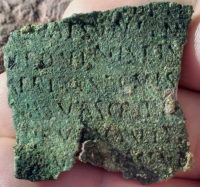 A small fragment of a ancient Roman bronze military diploma has been discovered in the ancient city of Deultum in southeastern Bulgaria. The diploma was a formal Roman document issued to a soldier from an auxiliary unit after he had completed 25 years of military service. It granted him a discharge from the army and full Roman citizenship. Any wives or children they had picked up along the way despite the prohibition against soldiers marrying would be legitimized and granted citizenship through this same diploma. The document was engraved on two bronze tablets joined by a hinge, which is the etymology of the word diploma, from the Greek “diploō” meaning to double or to fold in two.
A small fragment of a ancient Roman bronze military diploma has been discovered in the ancient city of Deultum in southeastern Bulgaria. The diploma was a formal Roman document issued to a soldier from an auxiliary unit after he had completed 25 years of military service. It granted him a discharge from the army and full Roman citizenship. Any wives or children they had picked up along the way despite the prohibition against soldiers marrying would be legitimized and granted citizenship through this same diploma. The document was engraved on two bronze tablets joined by a hinge, which is the etymology of the word diploma, from the Greek “diploō” meaning to double or to fold in two.
The fragment discovered at Deultum is very small, measuring only 4 x 4 cm, but allows us to reveal much about the document it was part of. The diploma contained a copy of a decree by the Roman Emperor Hadrian, issued on July 17, AD 122, for honorary discharge of the soldiers from the auxiliary troops in the Roman province of Dacia Inferior, i.e. “Lower Dacia” (located in the central part of southern Romania). At that time, the province was governed by Cocceius Naso.
Deultum was founded around 70 A.D. as a settlement for veterans of the Legio VIII Augusta at a strategically significant location on the Sredetska River with direct access to the Bay of Burgas and the Black Sea. It was the first Roman colony established in what is now Bulgaria. One of the oldest legions in Rome, Legio VIII had served in Gaul, at Pharsalus and Egypt under Julius Caesar. It was reconstituted by his heir Augustus who gave it his cognomen. In 46 A.D., it fought under Claudius suppressing the anti-Roman revolt in Thrace and founded the military camp at Novae about 150 miles northwest of Deultum.
Emperor Vespasian settled the veterans of this venerable legion who had supported him during the upheavals of the Year of Four Emperors near an ancient Thracian town called Debelt or Develt, hence Deultum’s official name: Colonia Flavia Pacis Deultensium. The city grew and prospered, reaching its peak of territory and population during the Severan dynasty in the late 2nd, early 3rd century. It had large public baths, a well-planned city with excellent sewers, numerous temples dedicated to Greco-Roman deities and local gods and the right to mint coins. At least two emperors visited it in person.
The newly discovered fragment reveals for the first time that even half a century after the founding of the colony, Roman emperors continued to settle veterans in Deultum in order to support the Roman presence and identity in a city surrounded by non-Roman population.